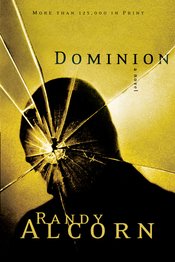In the past few weeks, while writing a book, keeping up with this daily blog, posting on Big Government, teaching a class every Sunday, and continuing to watch over the department I chair at the university—I actually read a couple of books, too. I’d like to recommend them.
Back in January, I wrote about a novel called Deadline by Randy Alcorn. It was thought-provoking and decidedly Christian in its philosophy. You can go back to January 9 to see that review. I’ve now completed that trilogy; I can say without hesitation that the second and third books are just as good, and perhaps even better.
 Dominion takes readers into the world of gangs and racial animosities. It does so through the eyes of its protagonist, a black newspaper columnist still struggling with the discrimination of his upbringing, yet rejecting the liberal welfare state as the answer. He’s also groping his way toward a genuine relationship with God after the disillusionment of the “prosperity gospel” he had adopted.
Dominion takes readers into the world of gangs and racial animosities. It does so through the eyes of its protagonist, a black newspaper columnist still struggling with the discrimination of his upbringing, yet rejecting the liberal welfare state as the answer. He’s also groping his way toward a genuine relationship with God after the disillusionment of the “prosperity gospel” he had adopted.
His sister has been killed and he pushes for answers, sometimes in appropriate ways, other times with questionable tactics. His heart has gone cold, but he has to deal with the spiritual questions that intrude into his mind, as well as their application to the city and neighborhood where he lives. It’s a theological, social, and political combination that makes readers grapple with their own attitudes and reactions to injustices.
 Deception, the final offering in the trilogy, is written in the first person, through the eyes of a detective who is trying to unravel the mysteries surrounding a murder that seemingly has no answers. The detective has recently lost his wife and carries a grudge against a God who won’t stop people from doing evil. Again, readers are drawn into a theological question that has very practical ramifications for life.
Deception, the final offering in the trilogy, is written in the first person, through the eyes of a detective who is trying to unravel the mysteries surrounding a murder that seemingly has no answers. The detective has recently lost his wife and carries a grudge against a God who won’t stop people from doing evil. Again, readers are drawn into a theological question that has very practical ramifications for life.
Alcorn uses a technique in all three books that is unique, at least in the books I’ve read to date: he intersperses the action on earth with the experiences of those who have died and have entered into heaven. His ideas of how heaven operates is fascinating. On a couple of occasions, he also takes us down to hell to see what it’s like for a character who has rejected the love of God.
Sound too preachy? Perhaps a little too fanciful? If I were reading this review and hadn’t experienced the books myself, I can see where you might think so. Believe me, though—both books are rooted in earthy reality. Alcorn’s gift is to combine the gritty, seamy side of life with spiritual concepts and make heaven more real than what takes place on earth.
I highly recommend both books, but you might want to read Deadline first to maintain the continuity of the characters and follow their development.
